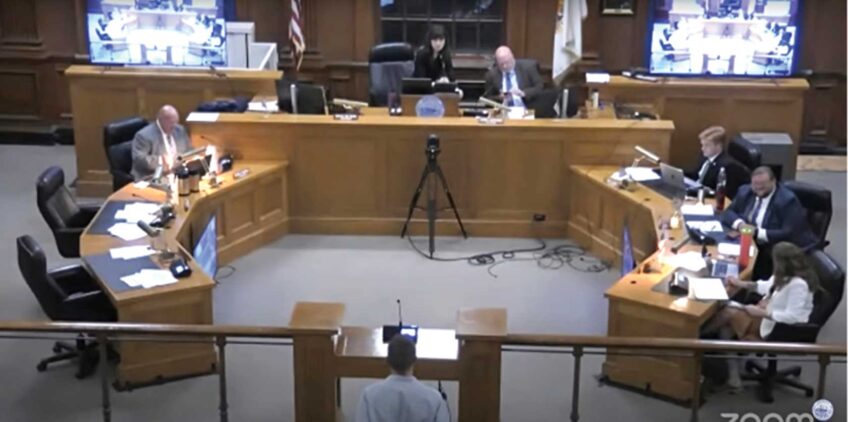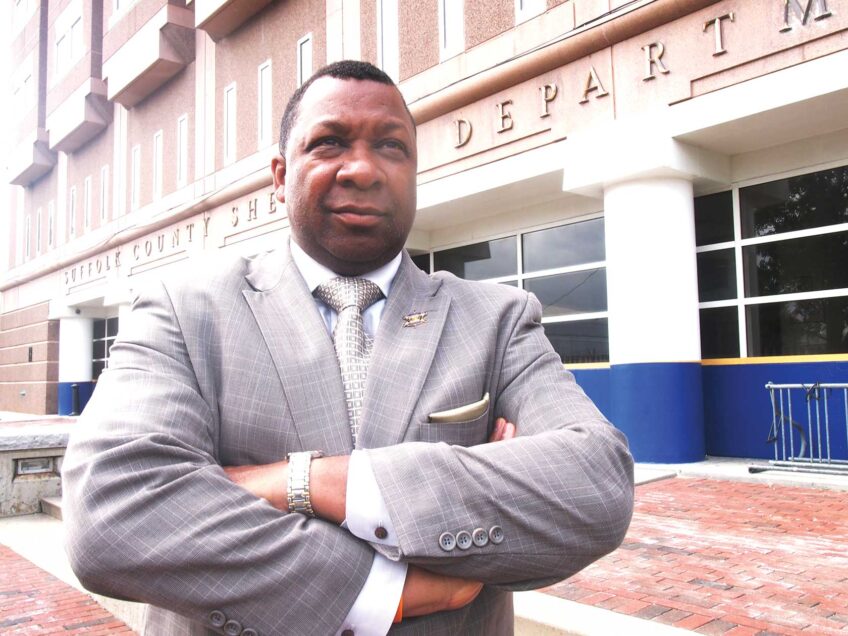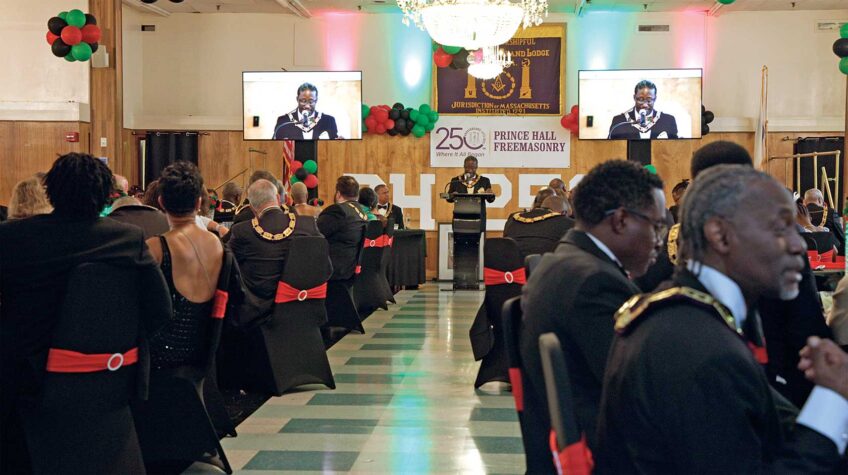Described by one observer in 1894 as “one of the most noted men of his race, an orator of the highest ability, and a lawyer second to none in his profession,” Edwin Garrison Walker was born in Boston, Mass. in 1830 to Eliza and David Walker.
A year before his birth, his father, an outspoken abolitionist and anti-slavery activist, wrote the best-selling book, Appeal to the Coloured Citizens of the World — an incendiary 78-page publication, urging enslaved black people to revolt against their captors. Edwin did not know his father, who died months before he was born.
Walker’s mother, Eliza, helped found the United Daughters of Zion in November 1845. Formed for the better protection of Boston’s black women, its aims were both benevolent and literary. Emblazoned on its banner were the words, “No Gentlemen Need Apply.” At the beginning of the twentieth century, the United Daughters of Zion was the oldest black women’s organization in the country.
After graduating from the public schools, Walker learned the Morocco leather trade. By 1857 he owned a leather shop employing fifteen men. On Nov. 15, 1858, he married Hannah Jane Van Vronker, a twenty-three year-old domestic from Lowell, Mass., and for the next eight or nine years they lived at 28 Belmont Street in Charlestown. The U.S. Federal Census for Charlestown reveals that by 1870 the couple had separated, Edwin Walker had fathered two children of the marriage — Edwin E., born about 1859, and Grace, born about 1864 — and he had moved to 36 Belmont Street with them. His mother, Eliza, lived there as well, “keeping house.”
But other evidence, namely the 1863 record of births in Lowell and the 1870 U.S. Federal Census for the same city, suggests that Edwin and Hannah Walker may have been the parents of a third child named Georgianna, likely born on June 28, 1863, and that by 1870 Georgianna Walker was living in Lowell with Hannah and her mother, Lucinda Van Vronker.
Edwin Walker took part in an important event in Boston’s history. When the fugitive slave Shadrach Minkins was arrested in the city on Feb. 15, 1851 under the Fugitive Slave Act of 1850, Walker — an anti-slavery activist like his father — conspired with Lewis Hayden, Robert Morris Sr. and members of the Boston Vigilance Committee to break into the old courthouse to rescue Minkins.
Shortly after that, Walker purchased a copy of Blackstone’s Commentaries and other law texts and began studying law. He passed the bar examination in May 1861, becoming the fourth African American to gain admission to the Suffolk County Bar.
He gave up his leather business and, for a year or two, practiced law with John Q. A. Griffin in Charlestown. Then between 1863 and 1864, Walker opened his first law office there at 25 City Square. Always eager to assist those in legal trouble, he became an effective advocate and earned a reputation in the courts as an exceptional attorney.
As he grew in stature, his law practice grew as well. Walker’s ability did not escape the notice of members of the bench. Judges frequently assigned him to conduct the defense in important criminal cases, including several murder cases.
Walker was elected to the Massachusetts General Court as a Republican from Charlestown’s Third Ward on Nov. 6, 1866, becoming the first black man elected to a state legislature in the United States. That same day, the residents of Boston’s Ward Six elected black Civil War veteran Charles Lewis Mitchell state representative as well.
There had always been a friendly dispute between the two as to who was truly the first black man elected to the Massachusetts legislature. Walker reasoned that he was elected first because Charlestown’s polls closed an hour earlier, and the vote was returned and published two hours earlier than in Boston.
While serving in the House in 1867, Walker championed women’s suffrage, and he and Mitchell were part of a tiny minority who had voted against ratification of the 14th Amendment to the U.S. Constitution. They believed that it fell far short of guaranteeing full citizenship rights to Southern blacks. Full citizenship rights to them meant being politically vested. Thus, they preferred an amendment that affirmatively prohibited “the disfranchisement of any citizen on account of color.”
Section two of the 14th Amendment gave the states the choice of either granting suffrage to all adult male citizens, or suffering a reduction of representation in Congress and in the Electoral College proportionate to the number denied the right to vote. Walker gave a speech on the House floor, warning that even with section two’s penalties, permitting racial disfranchisement would establish “a system of serfdom” and place black people—many who had fought to save the Union—“at the mercy of their enemies.”
He also sharply criticized the Republicans for failing to fully protect the interests of blacks, and it was because of his criticism, and the fact that he wouldn’t do their bidding, that they refused to re-nominate him for his House seat. This caused the bitter fight that Walker had so long waged against the party.
A prominent black man in the Republican Party, Walker’s dissatisfaction with it led him to abandon it. In fact, he, more than any other person, was responsible for more African Americans leaving the Republican Party in Massachusetts.
In 1881, Walker told a gathering at Monument Hall in the Bunker Hill district that the first newspaper that he had any recollection of ever trying to read was The Liberator — an abolitionist weekly founded by Garrison in 1831 — and from that he learned that “to oppress any part of God’s humanity [that] was wrong.” Like his father, he said that it was the right and the duty of the oppressed people to rise up and strike down their oppressors.
Walker was an enthusiastic supporter of Governor Benjamin F. Butler, a Democrat. The governor rewarded him for his support by nominating him as judge of the Municipal Court of Charlestown. The confirmation of Walker was backed by several respected black attorneys, including Butler R. Wilson, James H. Wolff and Edward Everett Brown, and by black former state representative John J. Smith.
As Walker was clearly qualified for the judgeship, it was generally thought that the Republican-controlled Executive Council would confirm his nomination for fear that the party would lose a large section of the black vote if it did not. But it rejected his nomination by a tie vote of four to four on Oct. 5, 1883.
A month later, however, Governor Butler appointed another African American to the same court—George Lewis Ruffin. Perhaps more concerned that rejecting a second black nominee would cause most African Americans to abandon the party, believing Ruffin to be a loyal Republican, the Executive Council confirmed his nomination on Nov. 7, 1883, making him the first black judge in the United States.
Walker and Ruffin had been, and remained, close friends. When the judge died three years later on Nov. 19, 1886, Walker served as a pallbearer at his funeral. Although denied the honor of a judgeship, Walker was still known to his friends as “Judge” Walker.
On May 21, 1888, Mayor Hugh O’Brien, a Democrat, nominated Walker to serve a three-year term as a member of the Board of Assessors. The Boston Globe reported that his appointment would probably be confirmed, but on June, 11, 1888 a Republican-controlled Board of Aldermen rejected it—seven nays, four yeas—all seven Republican members having voted against it. In fact, the board twice rejected Walker’s nomination for principal assessor.
Frustrated with the board’s actions, the mayor said, “I turned to outsiders and, on the recommendation of prominent gentlemen, presented the name of Judge Walker for the position — a lawyer of learning and culture, well versed in the laws of taxation, and of good practical business ideas.” O’Brien concluded, “He was rejected on account of his color.”
The failure to secure an appointment as one of Boston’s principal tax assessors—a position that paid $3,000 a year—was a bitter disappointment to Walker, and he never forgave the Republicans. He became an independent but remained a loyal supporter of O’Brien.
Speaking at Zion’s Church on North Russell Street on Election Day, Dec. 10, 1888, he urged black Bostonians to support the mayor in his re-election bid, advising “that in municipal affairs we should not be bound by party.” O’Brien, however, lost the election to Republican Thomas N. Hart by a 2,701-vote margin, 30,494 votes to 33,195 votes.
In 1885, Edwin Walker was a sole practitioner with an office at 175 Washington Street in Boston, but around 1888 he and African American attorneys James H. Wolff and Edward Everett Brown established the firm of Walker, Wolff & Brown at 46 School Street — the first black law firm in Massachusetts. Walker stayed with the firm about five years.
He served as a Justice of the Peace for many years and, from 1888 through 1890 and in 1892, as president of the Colored National League (CNL).
When asked in May 1893 whether discrimination still existed in Boston, Walker replied that “old time prejudice” was fast dying out, but there remained one barrier that prevented the race from making more rapid strides along the path of progress.
“No matter how well our boys and girls are educated, they are unable to obtain any opening in the business world” he observed.
Indeed, in the late 19th Century Boston’s business community refused to employ educated young blacks for anything other than menial work. Walker hoped that they would “have the same opportunities as their white schoolmates to enter the large business concerns as salesmen and clerks.”
“Then they will begin to make money,” he predicted, “and the effect will soon be noticed.”
Nearly six feet tall, Walker had an abundance of long gray hair. He was a courteous self-sacrificing man who rarely talked about himself—a loyal friend of many, but a foe to all who would do harm to his race. He believed that given a fair field in which to play, black people’s possibilities were limitless.
Walker represented many Irish people, empathizing with them because of the wrongs they endured from England. He believed that the Irishmen in Ireland were always the friend of the black man. On his law office walls hung portraits of the Irish patriots Edmund Burke and Daniel O’Connell. He had often wished that there could be some black leader like O’Connell, “who could come out and strike such blows as he had done for the liberation of the Irish people.”
The leader looked forward to the coming of the time in this country when men would not be known by the color of their skin, “but when the only questions asked of him who shall aspire to place shall be: ‘Are you an American citizen? Are you honest? Are you capable? And will you do the work as well as other men who entertain opinions like your own of the best way to govern the country?”
Walker was connected with the Odd Fellows and actively associated with the Order of Brothers and Sisters of Love and Charity. At the time of his death, he was president of the Equal Rights Association. He had relocated his law office to Pemberton Square by then and resided at 2 Phillips Street in the West End. Edwin Garrison Walker died at his home on Jan. 13, 1901 after an illness of several weeks. His former law partner James H. Wolff and Dr. Isaac L. Roberts helped make the arraignments for his funeral, which took place at the Charles Street A.M.E. Church. Walker’s passing caused profound sorrow among the black people of Boston and vicinity.






